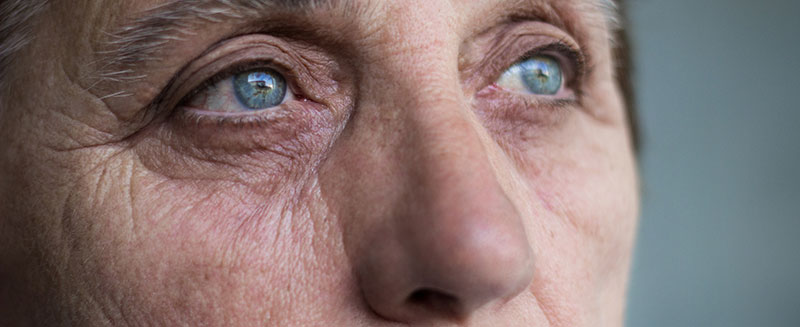
Alzheimer’s disease doesn’t just affect a senior’s brain; it can also cause vision issues.
The intricate, thorough steps involved in making it possible for us to see are incredible. In the blink of an eye, our brains can take transmitted data from our environment, interpret that information with input from our other senses, experiences, and thoughts, and then formulate an understanding of that information to help make us aware of what it is we are viewing.
It is understandable then that Alzheimer’s disease may impact a person’s sight, resulting in misconceptions and visual deficits, particularly in the areas of:
- Depth perception
- Color perception
- Contrast
- Motion recognition
- Peripheral vision
As though that were not daunting enough, older adults with dementia may suffer a distorted sense of reality in the form of delusions. For instance, imagine a person with Alzheimer’s disease or another type of dementia sees a shadow on the ground. The senior might mistake it for something innocent, such as the family’s pet dog, or a threat, like a burglar. Other types of visual misperceptions in dementia could include:
Misinterpreting their own reflections in a window or mirror for another person. This could lead the senior to think someone else is there, and in the case of a bathroom mirror, may lead the senior to avoid going in when needed, causing discomfort and distress.
- Thinking that images on the television are real and happening in the room.
- Problems with sitting in a chair or on the commode, fearing they will fall.
- Feeling overwhelmed in overstimulating settings that create confusion.
- Reaching out for things that are not there, or missing the mark in attempting to grab something.
- Difficulty with eating and drinking.
Try these tips to assist a senior loved one with dementia who’s challenged by eyesight changes:
- Make sure there is enough light in the home, and remove any items that are leading to anxiety or visual confusion if possible.
- Utilize contrasting colors. For example, serve a light-colored cream soup in a dark bowl.
- Close all blinds or draperies at night and also whenever the sunlight causes a glare.
- Use adaptive equipment like remote controls and telephones with bigger buttons to help encourage the senior to maintain independence regardless of visual problems.
At Abby Senior Care, our Denver senior care experts are committed to making sure the older adults in our care are always safe and thriving. Our highly trained dementia caregivers understand the visual and other changes that can occur, and are equipped with creative, thoughtful approaches to help.
To learn more about our in-home dementia care services, or to request additional resources related to caring for a senior at home, contact us any time at 303-699-8840. Visit our Service Area page for a full list of the communities where we provide care.
